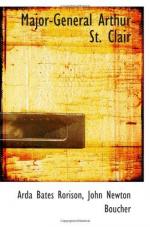|
This section contains 356 words (approx. 2 pages at 300 words per page) |
Encyclopedia of World Biography on Arthur St. Clair
Arthur St. Clair (1736-1818), Scottish-born American soldier and politician, was the first territorial governor in United States history.
Arthur St. Clair was born on March 23, 1736, in Thurso. He attended the University of Edinburgh and had some training with the prominent London anatomist William Hunter. St. Clair joined the British army as an ensign in 1757 and served with Col. Jeffery Amherst in Canada. Three years later he married Phoebe Bayard, who bore him seven children. In 1762 he resigned his army commission and bought 4,000 acres of land in western Pennsylvania, which made him the largest resident landholder in that area.
This distinction brought St. Clair local responsibilities. He served as the agent for Governor William Penn in 1771 and justice of the Westmoreland County Court 2 years later. For several years he represented Pennsylvania in its fight with Virginia over the territory at Pittsburgh, but he had little success.
In 1775 St. Clair became a colonel in the American army, and a year later he became a brigadier general, serving with George Washington's forces in the American Revolution. By the spring of 1777 St. Clair had been promoted to major general and received command of Ft. Ticonderoga. When he evacuated that post, Congress recalled him. Although a court-martial cleared him in 1778, he received no further army assignments.
Returning to civilian life, St. Clair reentered politics. He was a member of the Pennsylvania Council of Censors in 1783; in 1785 he was elected to the Continental Congress, becoming president of that body 2 years later. When Congress established the Northwest Territory in 1787, St. Clair was appointed territorial governor.
St. Clair's career as governor was stormy. His territorial militia was dealt disastrous defeats by the Indians in 1790 and 1791. Meanwhile, his efforts to govern the territory caused considerable difficulty. He used his authority to obstruct legislation designed to curtail his power and democratize the territorial government. He opposed the move for statehood and, to delay it, tried to split the territory into smaller political units. When he denounced the Ohio Enabling Act as null, President Thomas Jefferson removed him from office. St. Clair then retired to his home near Ligonier, Pa., where he died on Aug. 31, 1818.
|
This section contains 356 words (approx. 2 pages at 300 words per page) |


